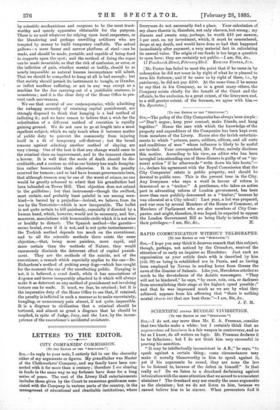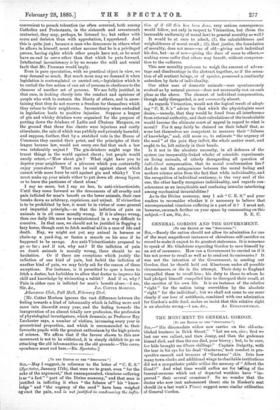SCIENTIFIC versus BUCOLIC VIVISECTION.
[TO THE EDITOR OF THE " SPECTATOR."1
Sin,—I do not, any more than Mr. E. A. Freeman, consider that two blacks make a white; but I certainly think that an argumentum ad hominem is a fair weapon in controversy, and so far as I know, do all writers on logic. Mr. Freeman declares it to be fallacious ; but I do not think him very successful in proving his assertion.
"It may be intellectually inconsistent in A.B.," he says, "to speak against a certain thing ; some circumstances may make it morally blameworthy in him to speak against it, yet if his arguments be sound, they are none the less to be listened to, because of the defect in himself." Is that really so ? Do we listen to a drunkard declaiming against intoxication with the same attention that we accord to a consistent abstainer ? The drunkard may use exactly the same arguments as the abstainer ; but we do not listen to him, because we cannot believe him to be sincere. When persecutors find it convenient to preach toleration (as often occurred, both among Catholics and Protestants, in the sixteenth and seventeenth centuries), they may, perhaps, be listened to; but rather with scorn and derision than with approbation, I apprehend. And this is quite just ; because a man who denounces in others what he allows in himself, must either assume that he is a privileged person, having rights which other people have not, or be must have an end to serve other than that which he puts forward. Intellectual inconsistency is by no means the mild and venial fault that Mr. Freeman would imply.
Even in pure speculation, with no practical object in view, we may demand so much. But much more may we demand it when legislation is contemplated or carried ont,—legislation which is to curtail the free action of one set of persons in obedience to the clamour of another set of persons. We are fully justified, in that case, in looking closely into the conduct and opinions of people who wish to restrain the liberty of others, and in ascertaining that they do not reserve a freedom for themselves which they refuse to their neighbours. Inconsistency when embodied in legislation leads to positive injustice. Suppose a league of gin and whisky drinkers were organised for the purpose of putting down the drinkers of Lafite and Chateau Margaux, on the ground that these fine clarets were injurious and costly stimulants, the sale of which was publicly and privately harmful; and suppose, further, that by a snatched vote in the House of Commons they carried their• point, and the principles of their league became law, would not every one feel that such a law was intolerably unjust ? The gin-drinkers might urge the truest thing d in the world against claret ; but people would surely retort,—' How about gin ? What right have you to deprive your neighbours of a pleasure which you contentedly enjoy yourselves ? What can be said against claret which cannot with more force be said against gin and whisky ? You must make up your minds either to put down all strong liquor, or to leave the partisans of claret alone.'
I say no more, but I say no less, to anti-vivisectionists. Until they come forward as the denouncers of all cruelty and pain inflicted for man's benefit on the lower animals, their ease breaks down as arbitrary, capricious, and unjust. If vivisection is to be prohibited by law, it must be in virtue of some general and impartial principle,—as that the infliction of pain on animals is in all CRSGS morally wrong. If it is always wrong, then our daily life must be revolutionised in a way difficult to conceive. In that case, we should not be justified in flogging a lazy horse, though sent to fetch medical aid in a case of life and death. Nay, we might not put any animal in harness or chain-up a yard-dog, or fasten a muzzle on his nose if he happened to be savage. Are anti-Vivisectionists prepared to go so far ; and if not, why not? If the infliction of pain on dumb animals is morally wrong, there should be no hesitation. Or if there are exceptions which justify the infliction of one kind of pain, but forbid the infliction of another kind of pain, we may fairly ask for the reason of these exceptions. For instance, is it permitted to spur a horse to fetch a doctor, but forbidden to allow that doctor to improve his skill and knowledge by vivisecting a rabbit ? And if so, why ? Pain in either case is inflicted for man's benefit alone.—I am, Sir, &c., JAS. COTTER MORISON. Athenceum Club, Pall Mall, February 23rd.
[Mr. Cotter Morison ignores the vast difference between the feeling towards a kind of inhumanity which is falling more and more into discredit every year, and the feeling towards the inauguration of an almost totally new profession, the profession of physiological investigators, which demands, as Professor Ray Lankester says, a number of victims, increasing every year in geometrical proportion, and which is recommended to their favourite pupils with the greatest enthusiasm by the high priests
of science. We affirm that if the favour shown to this new movement is not to be withstood, it is simply childish to go on attacking the Ad inhumanities on the old grounds.—This cone: spondence must end here.—En. Spectator.]



































 Previous page
Previous page